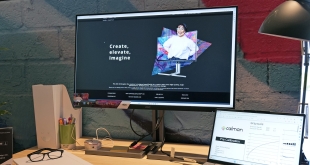Working in the field of data science is a concept that has only recently reached the professional lexicon, having previously worn the mantle of a dozen various jobs with related specialisations in aggregating and sorting data in order to put it to better use. It's the sort of field that has practical applications in every corner of the technology industry while codifying what hopeful prospects and jaded veterans should expect to encounter in their daily lives.
With that in mind, it's no wonder conferences like DataSciCon.Tech are hoping to bring together industry professionals for networking and hands-on experiences with their peers in the name of furthering the fields of data science, engineering and analysis. DataSciCon held its first event last year in Atlanta, Georgia at the tail end of November into December and boasted fair attendance, showing a solid indication of demand for professional lectures and hand-on workshops in the sector.
Yet those interested in furthering their knowledge of data science aren't solely concentrated in Georgia and the lessons learned through professional lectures are useful to both industry newcomers and those with a data science masters trying to round out their experiences and knowledge. The knowledge gleaned from group learning can be applied to nearly any industry, though the applications for data science are more immediately obvious.
Trying to quantify one's rate of data literacy is becoming a more difficult task to broach as time moves on. Where the data sciences were once scattered and unorganised, tech professionals and government employees alike are being clued in on the importance of not just collecting data, but also knowing what types of data exist and how they can be useful in one's field of expertise.
Take the obvious example of the field of artificial intelligence, where collecting and sorting data into useful categories can make or break how an intelligence develops and how it responds to future inputs. It's so vital that tens to hundreds of thousands of jobs worldwide are currently vacant due to a lack of qualified professionals. AI as a concept has been explored for decades, yet the field is so grossly understaffed that it's no wonder progress can feel stagnant when compared to other fields.
Combined with the inherent difficulty of narrowing data science projects to ones most likely to bear useful information, hosting more conventions with the intent of bridging the gap between the fields may just be a vital step in taking data science into a more accessible place. If project managers had even a cursory understanding of core data science concepts beyond the absolute basics, one has to wonder how tech projects would develop compared to the current landscape.
Progress may be slow, but there is already a push for data science advocacy amongst those who are close to adjacent fields that often see themselves headbutting the thought of taking hard sciences into their field; Marketing and data science occasionally come to blows, and even some AI project analysts are concerned with the efficacy of current trends in the field of data collection. There are very real concerns to be had in the more esoteric side of how pushing marketing solely by numbers can lead to unexpected results, but data science and artificial intelligence are too deeply connected to even try separating at this point.
In short, there may be more to be gained from focusing on hands-on experiences than hoping the industry sorts itself out without an occasional gathering of the minds. The impact of data science on almost every aspect of a business and even our society as a whole should push its importance ever higher and that trend will only continue as more and more projects rely heavily on the accuracy of its aggregated data.
 KitGuru KitGuru.net – Tech News | Hardware News | Hardware Reviews | IOS | Mobile | Gaming | Graphics Cards
KitGuru KitGuru.net – Tech News | Hardware News | Hardware Reviews | IOS | Mobile | Gaming | Graphics Cards


